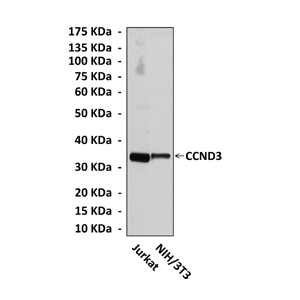Anti-CCND3: Mouse Cyclin D3 Antibody |
 |
BACKGROUND Cyclins are highly conserved proteins that activate Cyclin-Dependent Kinases (CDKs) to regulate the cell cycle, transcription and other cellular processes. There are several different Cyclins that are active in different parts of the cell cycle and that cause the Cdk to phosphorylate different substrates. There are also several "orphan" Cyclins for which no Cdk partner has been identified. For example, Cyclin F is an orphan Cyclin that is essential for G2/M transition. These Cyclins can heterodimerize with specific catalytic subunits, Cdks, to form holoenzymes. Some substrates of these holoenzymes, which are inactivated upon phosphorylation, are pRB and the related proteins, p130 and p107. It is thought that phosphorylation and inactivation of pRB leads to progression through the restriction point.1 The ability of the Cyclin/Cdk holoenzymes to phosphorylate pRB is inhibited by a family of small molecular weight proteins, known as Cyclin-dependent kinase inhibitors (CKIs). The concentration of cellular Cyclins varies in a cyclical fashion during the cell cycle; they are produced or degraded as needed in order to drive the cell through the different stages of the cell cycle. When concentrations in the cell are low, Cyclins dissociate from Cdk, thus inhibiting enzymatic activity.2 Cyclins themselves have no enzymatic activity.
D-type Cyclins couple extracellular signals to the biochemical machinery that governs progression through G1 phase of the mammalian cell division cycle. Induced by growth factor stimulation, D-type Cyclins assemble with Cyclin-dependent kinases CDK4 and CDK6 to form holoenzymes that facilitate exit from G1 by phosphorylating key substrates, including the retinoblastoma protein. Activation of the holoenzymes is antagonized by polypeptide inhibitors of CDK activity, which are induced by antiproliferative signals. Once cells pass a late G1 restriction point, Cyclin-D-dependent kinases are unnecessary for completion of the cell cycle, implying that their primary role is to sense the cell's readiness to replicate DNA and to enforce the commitment to enter S phase.3 Of the three D-type Cyclins, each of which binds Cyclin-dependent kinase (CDK), it is Cyclin D1 overexpression that is predominantly associated with human tumorigenesis and cellular metastases. In recent years accumulating evidence suggests that in addition to its original description as a CDK-dependent regulator of the cell cycle, Cyclin D1 also conveys cell cycle or CDK-independent functions. Cyclin D1 associates with, and regulates activity of, transcription factors, coactivators and corepressors that govern histone acetylation and chromatin remodeling proteins. The recent findings that Cyclin D1 regulates cellular metabolism, fat cell differentiation and cellular migration have refocused attention on novel functions of Cyclin D1 and their possible role in tumorigenesis.4
D-type Cyclins couple extracellular signals to the biochemical machinery that governs progression through G1 phase of the mammalian cell division cycle. Induced by growth factor stimulation, D-type Cyclins assemble with Cyclin-dependent kinases CDK4 and CDK6 to form holoenzymes that facilitate exit from G1 by phosphorylating key substrates, including the retinoblastoma protein. Activation of the holoenzymes is antagonized by polypeptide inhibitors of CDK activity, which are induced by antiproliferative signals. Once cells pass a late G1 restriction point, Cyclin-D-dependent kinases are unnecessary for completion of the cell cycle, implying that their primary role is to sense the cell's readiness to replicate DNA and to enforce the commitment to enter S phase.3 Of the three D-type Cyclins, each of which binds Cyclin-dependent kinase (CDK), it is Cyclin D1 overexpression that is predominantly associated with human tumorigenesis and cellular metastases. In recent years accumulating evidence suggests that in addition to its original description as a CDK-dependent regulator of the cell cycle, Cyclin D1 also conveys cell cycle or CDK-independent functions. Cyclin D1 associates with, and regulates activity of, transcription factors, coactivators and corepressors that govern histone acetylation and chromatin remodeling proteins. The recent findings that Cyclin D1 regulates cellular metabolism, fat cell differentiation and cellular migration have refocused attention on novel functions of Cyclin D1 and their possible role in tumorigenesis.4
REFERENCES
1. Xiong, Y. & beach, D. Curr. Biol. 1:362-4, 1991
2. Pestell, R.G. et al: Endocrinol. Rev. 20:501-34, 1999
3. Sherr, C.J.:Trend in Biol. Chem. 20:187-90, 1995
4. Fu, M. et al: Endocrinol. 145:5439-47, 2004
2. Pestell, R.G. et al: Endocrinol. Rev. 20:501-34, 1999
3. Sherr, C.J.:Trend in Biol. Chem. 20:187-90, 1995
4. Fu, M. et al: Endocrinol. 145:5439-47, 2004
Products are for research use only. They are not intended for human, animal, or diagnostic applications.
Параметры
Cat.No.: | CP10369 |
Antigen: | Raised against purified recombinant fragments of human Cyclin D3 expressed in E. Coli. |
Isotype: | Mouse IgG1 |
Species & predicted species cross- reactivity ( ): | Human, Mouse |
Applications & Suggested starting dilutions:* | WB 1:1000 IP n/d IHC n/d ICC n/d FACS n/d |
Predicted Molecular Weight of protein: | 34 kDa |
Specificity/Sensitivity: | Detects Cyclin D3 proteins without cross-reactivity with other family members. |
Storage: | Store at -20°C, 4°C for frequent use. Avoid repeated freeze-thaw cycles. |
*Optimal working dilutions must be determined by end user.
Документы
Информация представлена исключительно в ознакомительных целях и ни при каких условиях не является публичной офертой








